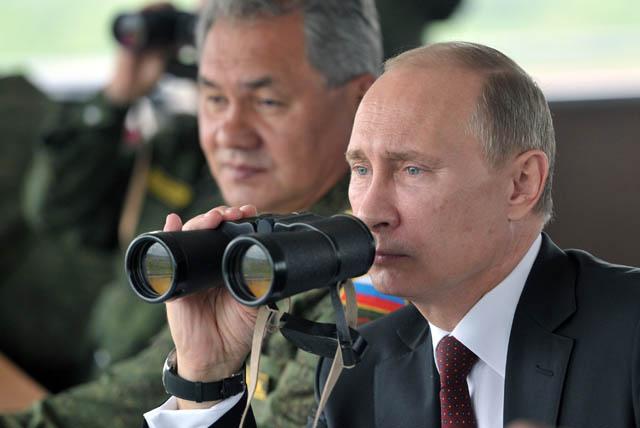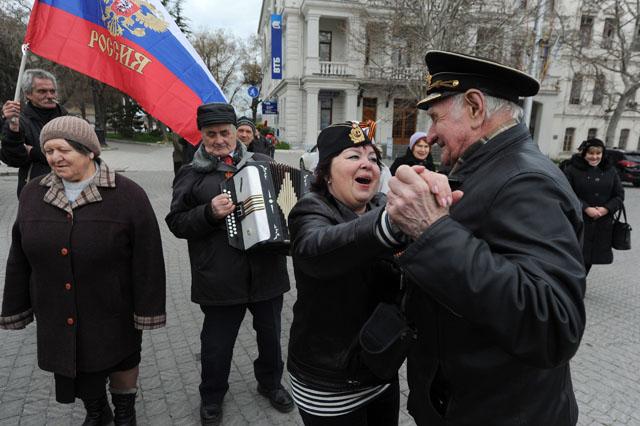You are here
Rival groups clash in Ukraine’s Crimea
By AP - Feb 26,2014 - Last updated at Feb 26,2014

SIMFEROPOL, Ukraine — Fistfights broke out between pro- and anti-Russian demonstrators in Ukraine’s strategic Crimea region on Wednesday as Russian President Vladimir Putin ordered major military exercises just across the border.
The tests of military readiness involve most of the units in central and western Russia, Defense Minister Sergei Shoigu said in a televised statement. He said the exercise would “check the troops’ readiness for action in crisis situations that threaten the nation’s military security”.
In Kiev, opposition leaders who took charge after pro-Russian president Viktor Yanukovych fled were working on forming a new government to chart a path forward for the country and its ailing economy. Parliament has delayed the announcement of the new administration, which was originally set for Tuesday, reflecting the political divisions among the various factions of the opposition.
When announcing Russia’s military exercises, Shoigu didn’t specifically mention the turmoil in Ukraine, which is bitterly divided between pro-European western regions, and pro-Russian areas in the east and south.
Three months of protests forced Yanukovych to go into hiding over the weekend as his foes set up an interim government following violent clashes between protesters and police that left more than 80 people dead.
In Crimea’s regional capital of Simferopol, about 20,000 Muslim Tatars who rallied in support of the interim government clashed with a smaller pro-Russian rally. One health official said at least 20 people were injured, while the local health ministry said one person died from an apparent heart attack.
The protesters shouted and attacked each other with stones, bottles and punches, as police and leaders of both rallies struggled to keep the two groups apart.
They started to disperse after the speaker of the regional legislature announced it would postpone a crisis session, which many Tatars feared would have taken steps toward seceding from Ukraine.
“The threat of separatism has been eliminated,” Refat Chubarov, the leader of the Tatar community in Crimea, told the crowd.
Crimean Tatars are a Turkic Muslim ethnic group who have lived in Crimea for centuries. They were brutally deported in 1944 by Soviet dictator Josef Stalin, but returned after Ukraine’s independence.
The tensions in Crimea — a peninsula in southern Ukraine that is home to Russia’s Black Sea Fleet — highlight the divisions that run through this country of 46 million, and underscore fears the country’s mainly Russian-speaking east and south won’t recognise the interim authorities’ legitimacy.
“Only Russia can defend us from fascists in Kiev and from Islamic radicals in Crimea,” said Anton Lyakhov, a 52-year-old pro-Russian protester.
According to the Russian defence minister, the military will be on high alert for two days as some troops deploy to shooting ranges. The actual maneuvers will start Friday and will last four days, he said. The exercise will involve ships of the Baltic and the Northern Fleets, and the air force.
The order came a day after a Russian lawmaker visiting Crimea said Moscow would protect the region’s Russian-speaking residents, raising concerns that Russia might make a military move into Ukraine.
“We take it for granted that all nations respect the sovereignty, and independence and territorial integrity of Ukraine, and this is a message that we have also conveyed to whom it may concern,” NATO Secretary-General Anders Fogh Rasmussen said.
On Wednesday, Yanukovych’s three predecessors as president issued a statement accusing Russia of “direct interference in the political life of Crimea”.
Russian officials denied any plans to move militarily on Ukraine.
“That scenario is impossible,” said Valentina Matvienko, speaker of the upper chamber of Russia’s parliament, known as the Federation Council. She is a close Putin ally and was born in western Ukraine.
“Russia has been stating and reiterating its stance that we have no right and cannot interfere in domestic affairs of a sovereign state,” she said. “We are for Ukraine as a united state, and there should be no basis for separatist sentiments.”
In Kiev, the capital, protesters who have demanded that the new government be close to the people, cut down a fence surrounding the Parliament building.
Ukraine’s acting interior minister ordered the disbandment of a feared riot police force known as Berkut, which protesters blamed for violent attacks against peaceful demonstrators.
The force, whose name means “golden eagle”, consisted of about 5,000 officers. It was unclear Wednesday whether its members would be dismissed or reassigned to other units.
Protesters took to the streets after Yanukovych’s decision in November to reject an agreement that would strengthen ties with the EU and instead seek closer cooperation with Moscow.
Anti-Yanukovych protesters set up a camp on Kiev’s Independence Square, known as the Maidan, demonstrating against corruption and human rights abuses, and calling for the president’s resignation.
Under an EU-mediated plan, Yanukovych and protest leaders agreed to form a new government and hold an early election, but Parliament later voted to remove him from the presidency. The protesters took control of Kiev and seized the president’s office as Yanukovych fled the capital. His whereabouts are unknown.
In Lviv, a major city in the European-leaning west of Ukraine, leading cultural figures tried to defuse the tensions between the Russian-speaking east and the Ukrainian-speaking west, calling on residents to speak only Russian on Wednesday in a symbolic show of solidarity.
The call appeared to have had some effect.
“You can really hear a lot of Russian spoken on the streets of Lviv today,” said Konstantin Beglov, one of the campaign’s promoters, “although it often leads to funny situations because Lviv residents hardly ever speak Russian”.
Related Articles
Pro-Moscow protesters in eastern Ukraine seized arms in one city and declared a separatist republic in another, in moves Kiev described on Monday as part of a Russian-orchestrated plan to justify an invasion to dismember the country.
Pro-Russian rebels shot down a Ukrainian helicopter in fierce fighting near the eastern town of Slaviansk on Monday, and Kiev drafted police special forces to the southwestern port city of Odessa to halt a feared westward spread of rebellion.
Crimea’s declaration of independence Monday from Ukraine triggered the toughest Western sanctions against Russia since the Cold War — with Washington and the European Union retaliating with asset freezes and travel bans and US President Barack Obama vowing to “increase the cost” if the Kremlin does not back down.


















